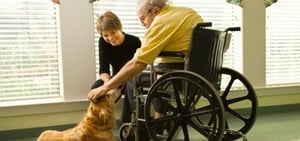As home care providers, we at ComForCare Home Care are often called due to an emergency: someone has fallen and injured themselves, or they have had a stroke. Understandably, people usually do not explore the topic of in-home care until it becomes a necessity. At ComForCare, we want to try and demystify in-home care, so when you need help, you are starting on solid ground. 
To begin, what exactly is home care? Home care is care provided wherever a person calls home. There are two kinds of home care: medical and non-medical.
What Is Medical Home Care?
The majority of medical care in Canada happens in hospitals and clinics. The goal of most medical home care is to keep a patient from returning to the hospital or to help a patient who cannot travel to a clinic or hospital. For example, if a patient is discharged from a hospital with an IV, a registered nurse (RN) would be assigned to help with the IV and monitor progress at home. Or, if a patient has dementia and cannot reliably make it into a clinic, an RN can administer care in the home. The majority of medical home care in Canada is provided by RNs. House calls by doctors are almost non-existent.
Medical home care is managed on a province-by-province basis and is covered financially by each provincial health authority. In Ontario, for example, Community Care Access Care (CCAC) manages medical home care. Here are the equivalents in other provinces:
- Alberta: Alberta Health Services
- British Columbia: Ministry of Health Services
- Manitoba: Manitoba Health
- New Brunswick: Government of New Brunswick
- Newfoundland and Labrador: Health and Community Services
- Nova Scotia: Nova Scotia Department of Health
- Nunavut: Nunavut Department of Health
- Prince Edward Island: Prince Edward Island Department of Health
- Quebec: Health and Social Services Centres and Service Québec
- Saskatchewan: Government of Saskatchewan
- Northwest Territories: Department of Health and Social Services
- Yukon Territory: Yukon Health and Social Services
If you or a loved one needs medical care at home, request an assessment with one of these organizations as soon as possible.
What Is Non-Medical Home Care?
Non-medical home care encompasses personal care and companionship. Non-medical home care often begins as an informal arrangement with family members. For example, if you stop by your elderly mom’s place on the way home from work and bring in her garbage bins every garbage day because she can no longer do so herself, you are providing non-medical home care.
More formalized agreements for non-medical home care often start with an activities of daily living (ADL) assessment. The ADL report identifies whether the person in need of care is independent, needs some form of standby or physical assistance or is totally dependent on outside help in any of the following areas:
- Grooming and hygiene
- Bathing and toileting
- Meal preparation
- Transportation
- Running errands
- Medication reminders
- Safety supervision
- Light housekeeping
- Companionship
After the ADL assessment is complete, personal support workers (PSWs) are scheduled to provide in-home care in any of the above areas where a client needs help. PSWs can be hired privately or through an agency. When you hire PSWs privately, you become the employer and are responsible for insuring, paying and collecting taxes from your PSWs. You also are responsible to replace PSWs who are sick or need a day off. However, you can hire PSWs through an agency, such as ComForCare.
How Do I Talk to My Loved One About Home Care?
Talking to your mom, dad or grandparent about home care doesn’t have to be an ordeal or cause any stress. By getting the conversation started, you’ll be better prepared if an emergency arises. For eight tips on how to have the conversation, please read our blog post, “Tips for Talking to Your Loved One About Home Care.”
What Does ComForCare Do?
ComForCare provides non-medical home care. At ComForCare, we manage the hiring, scheduling, insuring and training of a team of PSWs who are available 365 days a year, 24 hours a day. Clients use our services to give family caregivers a break for a short period of time. Or, we are called in to provide around-the-clock care. If you are faced with a loved one who needs care, please call us for a free consultation at 800-886-4044.
Editor’s note: This article was originally published Aug. 3, 2017. It has been revamped and updated for accuracy and comprehensiveness.
![Duel-Logo-CFC-AYS[rgb]](https://blog.comforcare.ca/hs-fs/hubfs/Duel-Logo-CFC-AYS%5Brgb%5D.jpg?width=525&name=Duel-Logo-CFC-AYS%5Brgb%5D.jpg)
